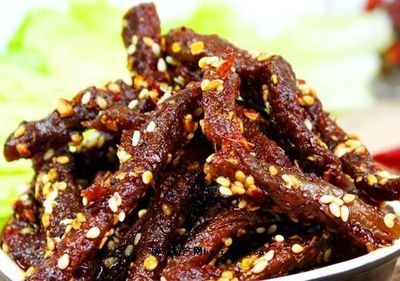Kangding yak meat

There are many wild medicines such as Fritillaria, Cordyceps and so on growing in these areas over 3500 meters. Yaks often eat these herbs, and their meat is incomparably delicious. After being killed, they can be roasted in brown sauce, stewed or dried in the cold. The taste is unique. Eating yak meat in Diqing is really a pleasure. And in the market to buy dried, dried meat floss and other gifts for young friends. Yak meat can be sticky with chili oil, and the taste is still delicious. Kangding beef not only has yak meat, but also smoked beef and so on. Compared with other Kangding specialties, it has a unique flavor.
Kangding yaks can not only be made into food, but also very useful! Kangding yaks have strong body, long coat, short tail, long hair like horse's tail, with dense and long hair on the abdomen and lower part of trunk, which looks like an apron, so it lies in the snow without cold. The bottom of the hoof has a hard like hoof like protuberant edge, so it can walk freely on the rugged mountain road. The upper lip is thin and flexible and can feed on dwarf grass. The coat color is black. It is said that the offspring of cattle are sterile.
Yak is a unique breed of cattle living in alpine grassland area above 3000 meters above sea level, mainly distributed in Qinghai Tibet Plateau and adjacent areas. Some people say that yaks are full of treasure, which is true. They can not only be used as a very favorable means of transportation, but also can carry people and carry things. Moreover, their meat is fresh and tender, not as rough as cattle or buffalo beef. Yak skin can be sewn into clothes, boots, bags, etc. the head of yak can be processed into craft products, the tail can be made into brooms, and the bullwhip is an aphrodisiac.

-
2.Expo Area of Acient Kiln & Folk Cultures in Jingde
Jingdezhen Ancient Kiln Folklore Expo Area, located in Fengshu Mountain and Panlonggang, Changjiang District, Jingdezhen City, Jiangxi Province
Time 2018-12-08 -
3.Laoshan Scenic SpotQingdao Shandong Province
Laoshan Scenic Area of Qingdao, located in Qingdao City, Shandong Province, is one of the first national key scenic spots approved and announced by the State
Time 2018-12-08 -
4.Hunan Forest Botanical Garden
Hunan Forest Botanical Garden, also known as Tianjiling National Forest Park and Changsha Botanical Garden, was established in 1985 with the approval of Hunan Provincial People's Government and is und
Time 2019-01-16 -
5.Dian Opera
Yunnan Opera is one of the local operas in Yunnan Province. Silk string (originated from the earlier Qin Opera), Xiangyang (originated from the Xianghe School of Han Diao) and Huqin (originated from H
Time 2019-04-26 -
6.Firing Techniques of Jizhou Kiln Ceramics
Jizhou kiln is a treasure of the traditional Chinese ceramic crafts. As a world-famous comprehensive ceramic kiln in Jiangnan (Ji'an, Jiangxi), it has strong local style
Time 2019-05-05 -
7.Traditional Textile Dyeing Weaving and Embroidery Techniques of the Li Nationality
The traditional spinning, dyeing, weaving and embroidery techniques of the Li nationality, the traditional handicraft techniques of Hainan Province, are one of the national intangible cultural heritag
Time 2019-05-12 -
8.The technical skill of penjing
Bonsai art refers to the Soviet bonsai art, which originated in the Tang Dynasty, flourished in the Ming Dynasty, matured in the Qing Dynasty, and developed in modern times. Since the 1980s, Suzhou Bo
Time 2019-06-09 -
9.Guizhou opera
Guizhou Opera is one of the local operas popular in Guizhou Province. It evolved and developed from the opera Yangqin (also known as "Wenqin", "Guizhou Playing Ci")
Time 2019-06-10 -
10.ivory carving
Ivory carving refers to the carving process and its products with ivory as the material. It is an ancient Chinese traditional art, folk arts and crafts. Ivory is the strongest part of an elephant. It
Time 2019-07-06 -
11.Zhenba Folk Song
Zhenba folk song is a huge cultural wealth created and accumulated by Zhenba people for thousands of years, and it is an important component of Zhenba regional culture. Zhenba folk songs are very rich
Time 2019-07-25 -
12.Laojunshan scenic spot in Pingshan County
Laojunshan scenic spot in Pingshan County is a provincial scenic spot approved by the people's Government of Sichuan Province. It is located on the southern edge of Sichuan Basin and is located on the arc-shaped tourism line of Chengdu Emei
Time 2020-10-16